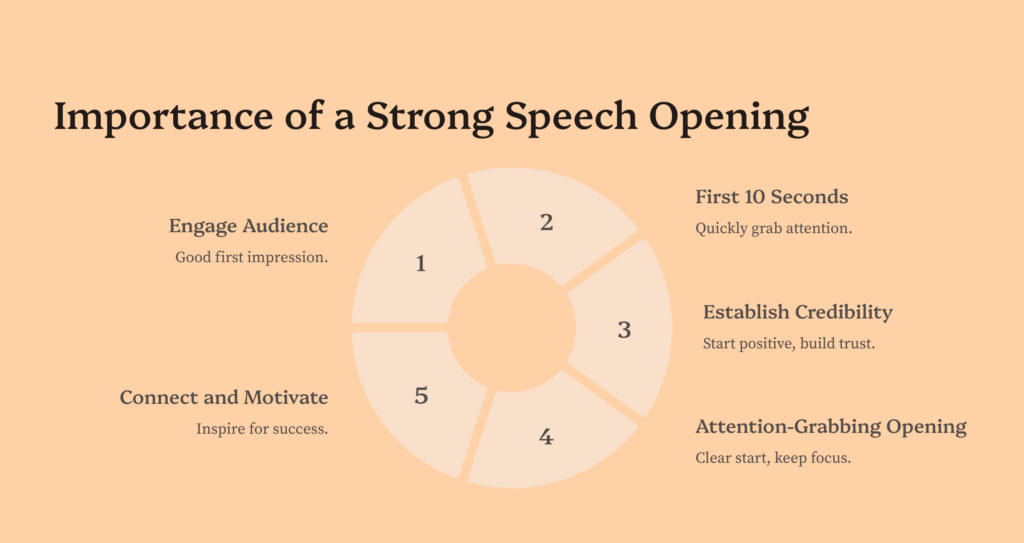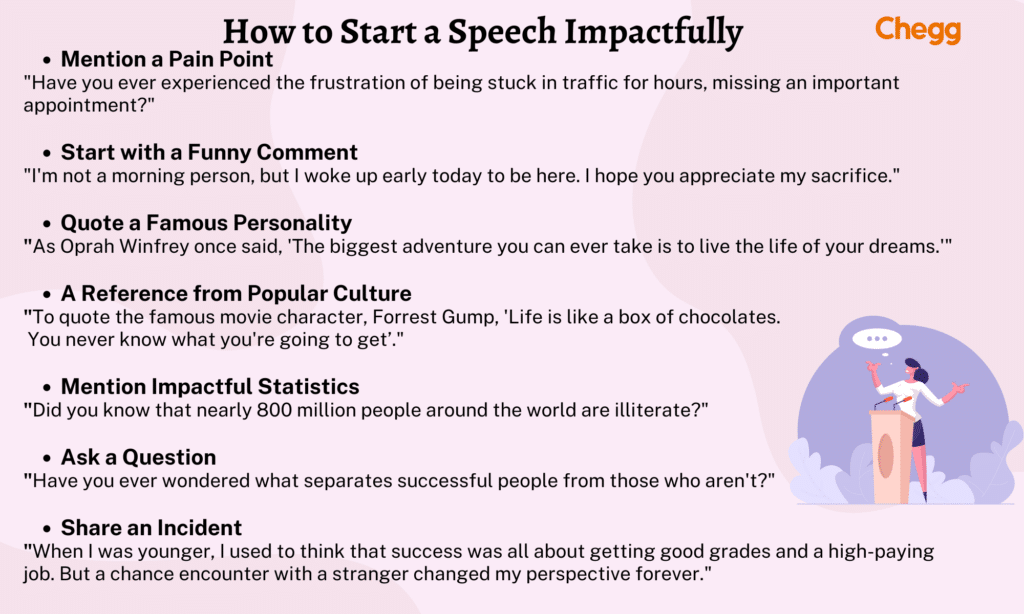

Quick Summary
As you prepare for your speech, you would like to know the best ways to open a speech to create an immediate tie to the attention of your audience. At a time when the average attention span falls to about eight seconds, even shorter time than that of a goldfish, traditionally suited introductions for a speech cannot serve the purpose any longer. Strategies are to be devised to draw listeners in and clear them from incessant distractions to start the speech. This guide offers seven creative methods through which an impactful speech can be started.
These techniques also enable you to gain confidence and relate to an audience from the very start of your speech. By learning how to start a speech that creates a connection and absorbs attention, you prepare the ground for presenting a strong, persuasive message. Use these methods to deliver a powerful speech that resonates, emboldens, and lasts.

Your speech’s theme will greatly determine how it should be opened. The following are some prompts to help you choose your speech-opening words:
Keep these very important points in mind while considering our suggested ways of opening a speech. Some will, upon your first review, suit your case more so than others.

The first few seconds are the most critical times for the speech itself. Almost instantly after an opening line, the audience will decide whether they will listen in or tune out the speaker. Generic openings like “Hi, my name is…” should be avoided, and attention should rather be caught by delivering a powerful introduction.
All in all, a strong start builds credibility and keeps the audience interested, and it makes the message more memorable. Make your introduction concise, relevant, and engaging so it can set the stage for a truly effective speech.

Starting with a pain point is an effective way to grab your audience’s attention and connect with them emotionally. This approach helps establish a common ground between you and your audience, making them more receptive to your message.
For instance, “Have you ever experienced the frustration of being stuck in traffic for hours, missing an important appointment?”
Starting with a humorous comment is an excellent way to break the ice and make your audience comfortable. This approach sets a light tone for your speech and helps put your audience at ease.
For instance, “I’m not a morning person, but I woke up early today to be here. I hope you appreciate my sacrifice.”
Starting with a quote from a famous personality helps establish credibility and can capture your audience’s attention. The question now comes about how to start a speech with a quote. This approach adds value to your speech and gives your audience something to consider.
For example, “As Oprah Winfrey once said, ‘The biggest adventure you can ever take is to live the life of your dreams.'”
Starting with a reference from popular culture is an effective way to relate to your audience and make your speech more engaging. This approach adds a personal touch to your speech and can help you establish a connection with your audience.
For instance, “To quote the famous movie character, Forrest Gump, ‘Life is like a box of chocolates. You never know what you’re going to get.”
Starting with impactful statistics is an excellent way to capture your audience’s attention and establish credibility. This approach helps you highlight the significance of your topic and can help persuade your audience to take action.
For instance, “Did you know that nearly 800 million people around the world are illiterate?”
Starting with a question effectively gets your audience thinking and engaged. This approach helps you establish the tone for your speech and can help you establish a connection with your audience.
For instance, “Have you ever wondered what separates successful people from those who aren’t?”
Starting with an anecdote is an effective way to personalize your speech and make it more relatable. This approach helps establish a personal connection with your audience and can help them relate to your message.
For instance, “When I was younger, I used to think that success was all about getting good grades and a high-paying job. But a chance encounter with a stranger changed my perspective forever.”

Also Read: Mind Map for Students
The common mistakes that people used to do in their speech openings are as follows:
The examples of weak & strong speech openings are as follows:
Example 1: “Hello, everyone. I am glad that you are all here to hear about a new project.”
Explanation: Routine, without engaging the interest of the audience. It carries the project topic but offers nothing to catch or awaken the audience’s interest.
Example 2: “Good morning. My name is [Name], and I’m here to present on [topic].”
Explanation: It is Clear but so straightforward as to almost be a little lacking in the whole emotional/brain-jarring connection part to the audience.
Example 3: “Welcome to my presentation. Let’s go at it now.”
Explanation: An introduction like this one fails to provide some context or reason as to why the audience would be particularly interested in what follows.
Example 1: Imagine waking up one day to feel that little sheen of power, that agency to mold your life a new- to change your path today; it will tell you the three ways to make your ‘wish’ come true.
Explanation: The opening message hypnotizes the audience with imaginative imagery and highlights his practical applications to prompt the audience to think about benefits to themselves.
Example 2: What if I told you that the key to unlocking unprecedented success lay hidden right inside everyday challenges? In the next 20 minutes, we will unveil the secrets by which top performers accomplish at their best in adversity.
Explanation: This introduction, on the one hand, incites thought in the audience and, on the other hand, promises the audience something that is quite unexpected and precious.
Example 3: “In a world where change is the only constant, today I will share a breakthrough idea that will change the way you think about your biggest challenges.”
Explanation: The opening sets this immediately in terms of relevancy and urgency to the audience and prepares the stage for insights that will provoke transformation while bolstering the speaker’s credibility.
These are clear indicatives that a powerful introduction draws attention, sets the stage, builds credibility, and pays worth to what follows afterwards. Thereby, attuning with the tactics would enhance the chances of drawing and holding the audience’s attention from the very get-go.
Are you nervous about giving a speech? Don’t worry; here are some tips for a captivating speech start and a guide on how to overcome nervousness while starting a speech.
1. Effect of a Timely Narrative or Anecdote: When starting a speech, at a perfect moment, a relevant story or personal anecdote can create an emotional bond between the audience and speaker. The technique makes punchier openings to speeches by rendering a more practical and unforgettable experience of setting the tone in the future for an important speech.
2. Mind-Engaging Questions to Ask the Audience: Asking the audience unexpected questions at the start can be the icing on the cake to create curiosity and active thinking. While such questions can be used to introduce a speech, they make relocations in opening the speeches that almost find the audience speaking along with the speakers.
3. Ways to Make Your Speech Openings Memorable: Using imaginative ways to appreciate- they can be anything from brilliant pictures, persuasive language, or startling statistics- would make sure that this introduction is outstanding. These will render a very special and moving introduction to the opening of your speech, and, in turn, have a more thrilling and memorable speech overall.
Also Read: Master the Art Of Speech Writing
The closure of any speech underscores the importance of starting in a manner that grabs the audience’s attention and establishes a compelling atmosphere. An opening that is animated by using an appropriate story, an incredible statistic, or a remarkable quote will connect with the listeners from the very first word. When you kick off a speech, think clarity, brevity, and connecting to the audience. Early emphasis on your central thesis generates eagerness and enhances trust. The beginning of any speech evokes confidence and is a prerequisite for an effective and memorable presentation. With this careful preparation, the speaker thereafter ensures that each point is delivered with clarity for starting a speech.

Ans. A good introduction for a speech captures the audience’s attention and interest from the beginning. Some effective ways to start a speech include sharing a surprising fact, telling a story or anecdote, quoting a famous person, sharing a relevant statistic, or asking a question. The introduction should set the stage for the rest of the speech and provide a clear direction.
Ans. A good greeting for a speech should be friendly and professional but also personalized to the audience. It’s important to thank the audience for coming, introduce yourself, and briefly overview what the speech will cover. You could also connect with the audience by mentioning a shared experience or interest or acknowledging a special occasion.
Ans. To start a 2-minute speech, you must capture the audience’s attention from the beginning. Begin with a strong hook, such as a thought-provoking question, a surprising fact, a personal story, or a humorous anecdote. Keep your speech focused and concise, sticking to one main point or message. Be sure to vary your tone and pace to keep the audience engaged, and end with a clear and memorable conclusion that leaves a lasting impact.
Ans. A good starting line for a speech should be attention-grabbing and set the tone for the rest of your message. For example:
“Imagine waking up tomorrow with no limits—what would you do differently?”
This encourages the audience to think and primes them for your main topic.
Ans. The key to a compelling speech opening is to capture your audience’s attention by sparking their curiosity, interest, or emotions. You can achieve this through a surprising fact, a thought-provoking question, a personal story, a meaningful quote, or a funny anecdote.

Authored by, Amay Mathur | Senior Editor




Amay Mathur is a business news reporter at Chegg.com. He previously worked for PCMag, Business Insider, The Messenger, and ZDNET as a reporter and copyeditor. His areas of coverage encompass tech, business, strategy, finance, and even space. He is a Columbia University graduate.
Editor's Recommendations
Chegg India does not ask for money to offer any opportunity with the company. We request you to be vigilant before sharing your personal and financial information with any third party. Beware of fraudulent activities claiming affiliation with our company and promising monetary rewards or benefits. Chegg India shall not be responsible for any losses resulting from such activities.
Chegg India does not ask for money to offer any opportunity with the company. We request you to be vigilant before sharing your personal and financial information with any third party. Beware of fraudulent activities claiming affiliation with our company and promising monetary rewards or benefits. Chegg India shall not be responsible for any losses resulting from such activities.